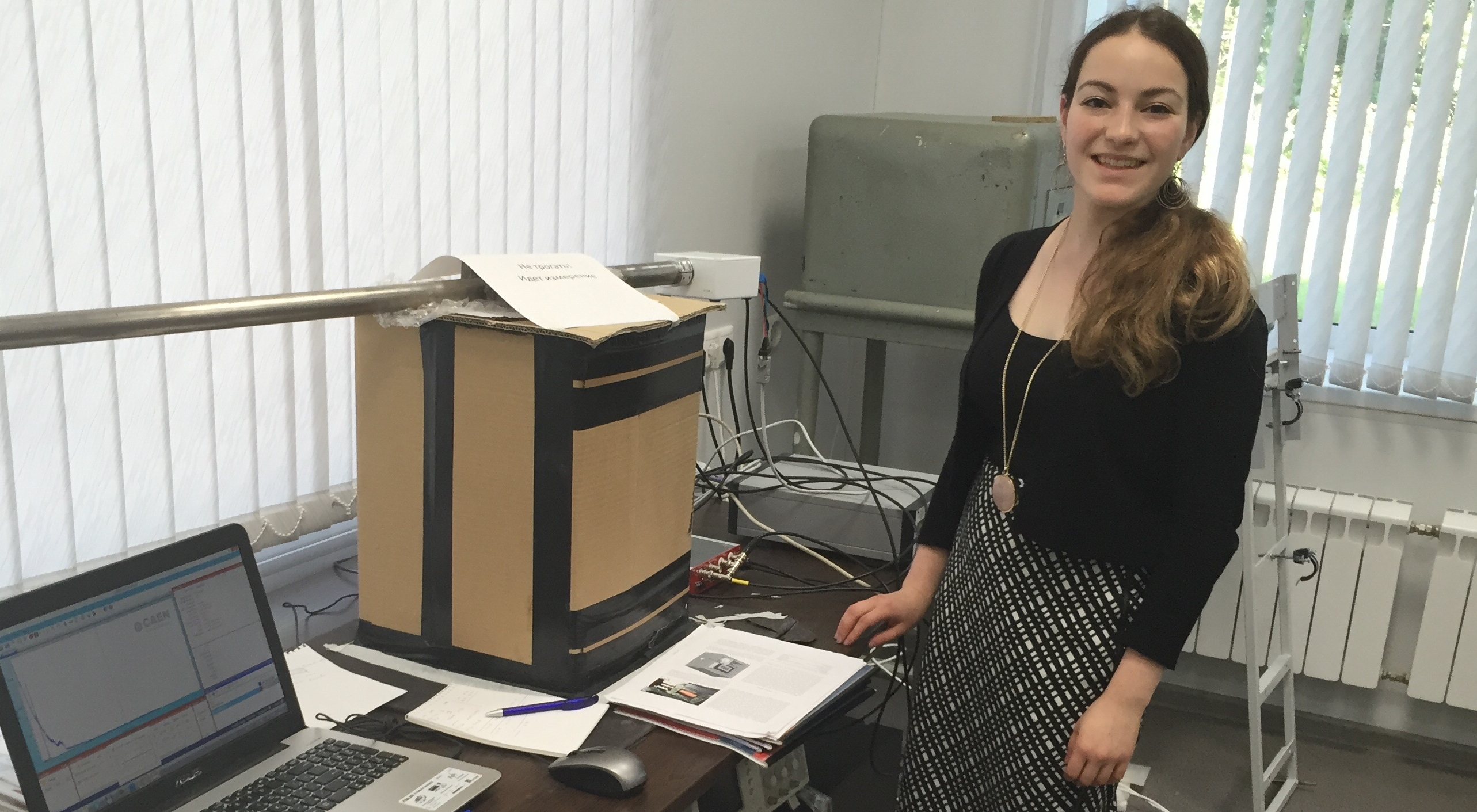- August 29, 2021
MIT freshman conducts experiments on radiation detection methods at renowned nuclear institute in Russia
Abigail Drokhlyansky (Physics ’19) conducted research at a renowned nuclear physics institute in Russia and contributed to scientific advances in ways she could never have imagined would be possible for a freshman.
Freshman Abigail Drokhlyansky spent the summer of 2016 working on a project to propose a new neutron detection method in the Laboratory of Nuclear Problems at the Joint Institute for Nuclear Research in Dubna.
Among existing radiation detection methods, a commonly used neutron detector is the Helium-3 (3He)-based portal monitor. However, 3He is in low supply and high demand, so a more affordable and easily available alternative is long overdue.
Abigail’s team proposed the use of NaI and CsI scintillation detectors to detect neutrons via measurements of coincidence events. They set up an experiment that collected data over the course of a month to compare the neutron signals recorded simultaneously by a 3He-based portal monitor and a cylindrical NaI(Tl) detector.
Being happy with the results, they followed up by writing a paper on their findings and submitting it to the repository of electronic preprints arXiv, while also attempting to submit the paper to journals for publication.
Abigail was tasked with analyzing the data from the 3He-based portal monitor. She wrote a computer program in ROOT that identified and removed the part of the data curve caused by background signals and calculated the neutron flux based on the signal peak within a certain energy range, per hour of data collected. Then she iterated this program over all the hours of data collected by the 3He-based detector throughout the month, and graphed the neutron flux over time.
“I had the opportunity to utilize the laboratories and resources at the Institute, which would never have been available to me in the U.S., and I was able to contribute to a scientific paper intended for publication, which is not a common opportunity for undergraduate students even at MIT,” she says.
Getting used to the Russian way of living
Abigail admits that she expected a general lack of friendliness in Russia. And indeed, strangers tended to look out for themselves, which often came across as pointless aggression.
She explains, “I had been warned about that and I learned to either disregard rude comments or actions among strangers or to overcome the barrier of negative treatment by introducing myself to those who I could potentially befriend. Despite their outward facade, Russian people are genuinely warm and kindhearted once one becomes acquainted with them.”
In addition, the slightly more minimalistic way of life in Russia took some getting used to. Russians didn’t seem to care much for the things that Americans often take for granted, such as instructions and warnings for everything. Abigail admits that at first she found this slightly intimidating, but then rapidly grew accustomed to this lifestyle.
What was more striking was the difference between gender relations in Russia and the U.S. At work, Abigail found the disparity between the way men and women were treated somewhat off-putting.
"Working in a laboratory among educated colleagues, I rarely encountered any issues besides the occasional comment about how impressive my coding skills were since I was a girl and occasional criticisms of my supervisor for supposedly making me do too much work,” Abigail says.
“Although I was not directly affected by this mentality, I noticed the stereotype applied to my female coworkers, who often worked in the laboratory because their husbands did, and who frequently were not given projects to complete or found themselves at a loss for what to do with their time.”
At the same time, Abigail found laboratory work in Russia more enjoyable than in the U.S. because of the difference in interactions with coworkers. “In Russia, people feel comfortable learning about their colleagues and discussing matters unrelated to work during lunch breaks, while, in the U.S., I have found that lunch breaks provide another opportunity to have group meetings and further work discussions,” she says.
Confirming interest in selected major
“Through my MISTI experience, I confirmed my interest in physics because I enjoyed the research that I conducted in Russia and would like to continue working in a laboratory setting,” Abigail shares. In addition, she felt more confident about herself and her abilities.
When Abigail arrived in Russia, she hardly knew how to code in ROOT, but by the end of the summer, she had used this computer language to analyze data and perform crucial steps towards the completion of the project. “Now I will feel more confident when speaking to recruiters at career fairs because I know I can learn the new skills necessary to complete a summer job, and I will not feel nervous or underqualified when applying to future UROPs,” Abigail says.
“I loved my time in Russia and enjoyed every day that I could work in such a fascinating research laboratory, bond with genuinely selfless people, and travel to places unlike any in the U.S., and I continue to miss the home that I found in Dubna this summer."
